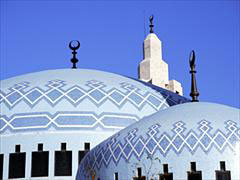|
||||||
Culture
There isn't much sign of traditional Arabic music in Jordan, but you will find an interesting hybrid of Arab-style singers backed up by orchestras of western and traditional instruments everywhere you go. The Bedouin are still hanging on to their musical traditions, with groups of men singing trance-like chants to accompany a lone belly-dancer.
Architecture is the predominant visual art in the Arab world, partly because Islam forbids the depiction of living things. Throughout Jordan you will find spectacular mosques, ancient ruins from the Roman Empire and earlier, and magnificent mosaics. The Qusayr 'Amra is notable for its frescoes, one of which shows a nude woman bathing - an unusual art form for this part of the world. The Qur'an is one of the finest examples of classical Arabic writing, while the Al-Mu'allaqaat is an even older collection of Arab poetry. One of the best-known works of Arab literature is Alf Layla wa Layla, A Thousand and One Nights, a collection of tales from several centuries and countries. Bedouin artworks include silver jewellery, colourful textiles and a wide range of knives.
Hospitality is a cornerstone of Arab life. It is commonplace for Jordanian families, particularly desert dwellers, to welcome strangers into their home. The tradition developed from the harshness of desert life - without food, water and shelter from strangers, most desert travellers would die. Wherever you go in Jordan, you are likely to hear the word, 'Welcome', and you will frequently be invited into people's homes for food or a cup of tea.
Islam is the predominant religion in Jordan. A monotheistic religion, Islam's holy book is the Qur'an, and Friday is its sabbath day. Every day, five times a day, Muslims are called to prayer from the minarets of mosques which dot the country. Islam derives from the same monotheistic roots as Judaism and Christianity, and Muslims generally regard Christians and Jews with respect - in Islam, Jesus is regarded as one of the Prophets of Allah, and Jews and Christians are considered fellow 'people of the Book'. Mohammed was the last Prophet, and it was to him that Allah dictated the Qur'an. Most Jordanian Muslims, including the non-Arab Circassians, belong to the Sunni sect of Islam. The Circassians - as well as the other Jordanian minority, the Chechens - were originally from the Caucasus area of Russia. |
|
|
Islamic law forbids eating pig and drinking alcohol, and this law is followed to a greater or lesser (generally lesser) extent throughout Jordan. Islam also has a tendency to divide the sexes, and you might find that many eating establishments only welcome men. Most of these will, if asked, show you to the 'family room', an area set aside for women. When Jordanians eat out they will usually order group meals - a selection of mezzeh, or starters, followed by main meals to share. Arabic unleavened bread, or khobz, is eaten with almost everything. The other staples are felafel, deep-fried chickpea balls, shwarma, spit-cooked sliced lamb, and fuul, a paste of fava beans, garlic and lemon. Mensaf is a Bedouin speciality - a whole lamb, head included, on a bed of rice and pine nuts. |
|


